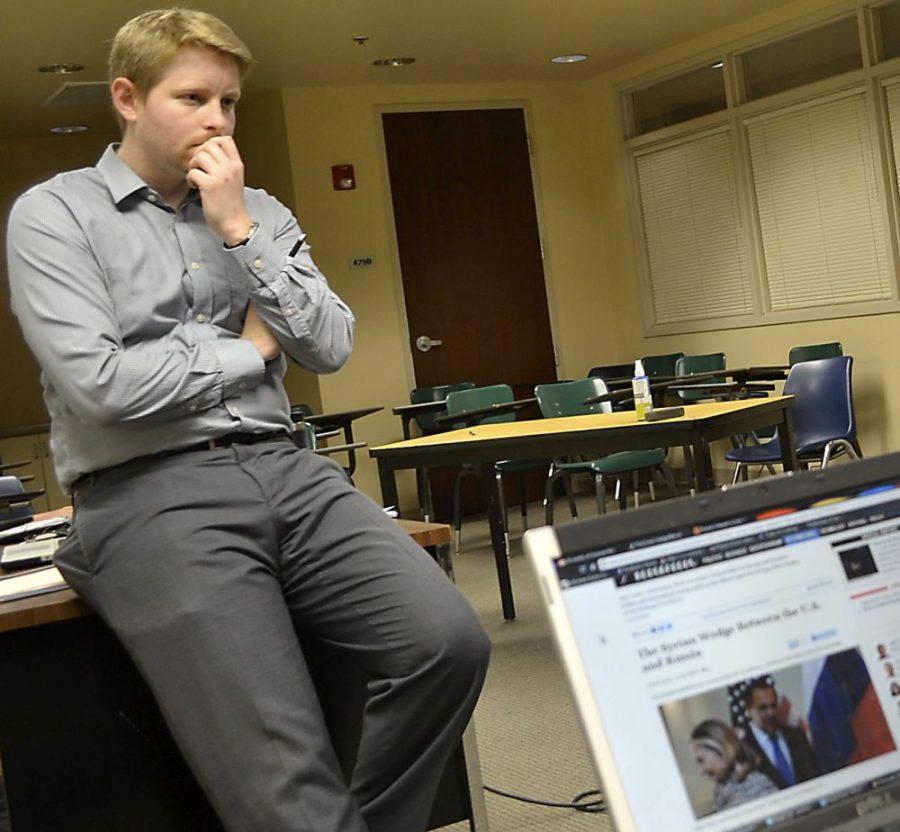Armed with only a stick on the outskirts of his Syrian neighborhood, Mohammad Hilou would keep watch at night and warn people if he saw the Syrian military approaching. They came one night, and they took Hilou with them.
His body — riddled with bullets and with a hole drilled in his head — was found the next morning. He was married, with two children.
“He wasn’t a hard-line revolutionary, just a normal person,” said Osamah Eljerdi, a molecular and cellular biology junior who described his relative’s gruesome death. “But he felt obligated to protect his neighborhood.”
Hilou is among the thousands of Syrians who’ve been killed by their government since the revolution started a year ago.
Government control makes it difficult to communicate with anyone in Syria. In Lebanon, which borders Syria, Eljerdi’s aunt found a YouTube video showing Hilou’s dead body. She gathered the details of his death and sent Eljerdi’s family an email with the video.
“It’s hard when you realize someone you know was killed,” he said. “You feel the impact of the tragedy.”
Surveillance cameras and cell phone taps are used so often that people get used to being spied on, said Muhammad Al-Khudair, a Near Eastern studies graduate student who lived in Homs, the “Capital of the Syrian Revolution,” for most of his life.
“Once in a while you find the courage to speak up — not in public of course — but to someone else in private,” he said. “You’re terrified for 10 or 15 days. If nothing happens, you’re safe. Then you wait a few days, speak up and the fear starts again.”
If a Syrian protested in public, Al-Khudair said a sniper’s bullet or a security agent’s torture tools could silence them. If the police feel “merciful”, he said, they’ll only slap and beat the person on the street and then let them go.
But even at home, nobody’s safe from the government, Eljerdi said.
“There’s thousands of security agents and a lot of people become suspicious of their own families,” Eljerdi added. “If they’re working for the government, your father or son will gladly throw you under the bus.”
Possibly the most destructive way to cause someone mental damage is to make them believe that the government is watching them at home, said Charles Raison, an associate professor of psychiatry.
“The more demanding something is and the less authority you have over it, the more likely you are to develop psychiatric symptoms,” he said. “Spying on people at home is how these horrible regimes operate and it’s the ultimate way to control people. It breeds insanity.”
Depression and post-traumatic stress disorder are common symptoms for people living under a dictatorship. Raison, who’s lived in Iran and is CNN’s mental health expert, said the media has been overlooking the psychological problems of people living under authoritarian Arab regimes.
“I haven’t heard anything about the long-term mental health consequences of what’s going on in the Arab Spring countries,” he said. “When all this is over, helping the victims with the horrific mental trauma they’ve experienced is one of the best long-term investments people can make for Syria.”
Cauterizing the violence is complex, especially since Russia and China oppose removing Syria’s president, Bashar al-Assad, said Matt Flannes, who teaches a class on the Arab Spring revolutions.
Flannes, a graduate student studying government and public policy who graduated from the School of Middle Eastern and North African Studies, said he doesn’t support U.S. military intervention, but might change his stance as the situation evolves.
Because of Syria’s proximity to Israel, its economic ties with Russia and its relationship with Iran, a failed U.S. policy would set off a chain of events that could lead to anything from higher gas prices to igniting a civil war, Flannes said.
“Those who say that people who oppose intervention are friends with Assad see the world in black and white. In reality, it’s more shades of grey,” he said. “But the consequences of inaction could lead to genocide. It’s an incredibly complex issue and there’s certainly a breaking point where the international community will have to act. Maybe we’re already there.”
Al-Khudair and Eljerdi suggested different forms of intervention, but both agreed that the solution, whatever it may be, should be initiated by the Arab League. Then the international community can follow.
Describing his vision for Syria’s future, Al-Khudair said he prays a better society will rise from the ashes of destruction.
“Syria is screaming,” he said. “But justice will come soon. It has to.”









